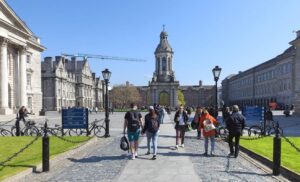Omulbanin Sultani was among the 19 Afghan students arriving in Scotland on August 20, eager to resume her studies at St Andrews University, with others set for Glasgow, Dundee, and Aberdeen.
“We endured 1,000 days of suffering to reach this point, 1,000 days of being confined to our homes, 1,000 days of having our voices silenced. One thousand days with nothing but tears and sorrow, 1,000 days of our lives wasting away,” said 21-year old Sultani.
In September 2021, the Taliban banned education for women and girls over 12 years old in Afghanistan.
Since, some attempts at embarking on studies abroad have been halted, including the case of 60 Afghan women being prevented from boarding their flight to Dubai to take up a scholarship.
“When we heard about the visa approval, we were so excited I felt like I was flying. We are going from hell to paradise,” said Sultani.
The group of Afghan trainee doctors were supported by Scottish charity the Linda Norgrove Foundation, which worked tirelessly to secured agreements with the four Scottish universities and spent months liaising with both the Scottish and UK governments.
The Scottish government amended student funding legislation to ensure the women could be treated as home students, meaning the women will therefore receive free tuition and cost of living support.
Cabinet secretary for education, Jenny Gilruth, was there to welcome the students at Edinburgh Airport when they landed.
“Gender should not be a barrier to accessing education, and I am pleased that the Scottish government has been able to support these extraordinary women in their journey to complete their medical education,” said Gilruth.
“Scotland has a proud history of welcoming people from across the world who need support,” she continued.
“I wish each and every one of these inspiring women the warmest of welcomes to Scotland and look forward to the positive contribution they will make to our country.”
Gender should not be a barrier to accessing education
Jenny Gilruth, Scotland’s cabinet secretary for education
John and Lorna Norgrove, who established the Linda Norgrove Foundation in memory of their daughter, a British aid worker who was killed in Afghanistan in 2010, were also waiting at the airport for the students to arrive.
“We’re all delighted to have finally succeeded after so much frustration,” said John.
The students’ journey to Scotland was plagued with delays.
“Finally, these 19 incredibly talented young women get their future back with the opportunity of a tremendous education and a career. The alternative for them in Afghanistan wasn’t good,” said John.
“Our heartfelt thanks go to all of our supporters, the politicians, civil servants and university staff who have made this possible. It’s been particularly heartening at a time of such division to see the UK and Scottish governments working together to achieve such a positive outcome for these women.”




